In today’s extract from The Bulletin by Stewart Sowman-Lund, what stopped the consumer price index from dropping even lower?
To receive The Bulletin in full each weekday, sign up here.
Inflation within target rate
The war on inflation is over and the cost of living crisis is nearing its end, declared Kiwibank’s economists yesterday afternoon. The latest figures from Stats NZ, reported the Herald’s business editor-at-large Liam Dann, showed inflation falling in the September quarter down to its lowest rate in more than three years at 2.2% – outpacing expectations and well within the target rate of 1-3%. The annual increase reported in the June quarter was a little over 3%.
As the graph below shows, imported (or tradeable) inflation fell 1.6% for the year, while domestic or non-tradeable inflation was still elevated at 4.9%.
In July, when it appeared inflation was finally on the decline, The Spinoff’s Shanti Mathias and Joel MacManus provided some excellent advice on how to host an “inflation is over” party (confetti balloons included). Maybe now it’s time to finally crack out the (cheap) champagne.
How the government reacted – and why
Leading off the general debate in parliament yesterday afternoon, finance minister Nicola Willis celebrated the result and declared that the “National-led government broke the back of the inflation beast”. A dramatic turn of phrase, but given the fact the government had pledged to have the economy turn a corner, possibly justified. “We have delivered the tax relief that the National Party campaigned on, we have delivered lower inflation, and we have delivered dropping interest rates,” continued Willis.
It’s worth remembering that while times may still be tough, the coalition government will be banking on economic improvements coming further into focus in time for the next election. People won’t necessarily cast their vote while looking in the rearview mirror, especially when it comes to their back pockets. As noted by The Spinoff’s Toby Manhire this week: “Assuming an economic recovery is imminent, the harvest is there to be reaped. And it could well pan out that way, as long as other factors, whether in social cohesion, say, or rising unemployment, don’t drown it out.”
The opposition, reported The Post, opted to tinge yesterday’s announcement with some concerns – namely the large numbers of New Zealanders choosing to leave the country. “Nicola Willis wants to take credit for getting inflation down. She should take responsibility for these statistics as well,” said Labour finance spokesperson Barbara Edmonds.
What will it mean for interest rates?
There could be further good news on the horizon. The Reserve Bank recently slashed the official cash rate by a larger than usual 50 basis points, and all signs point to it doing the same at least once more. BusinessDesk’s Pattrick Smellie (paywalled) reported that bank economists were unanimous in picking that interest rates will be slashed by another 50 points next month, bringing the official cash rate down to 4.25%.
But there is also some speculation the central bank could go a step further. Assistant Reserve Bank governor Karen Silk said she was tempted to “do a little jig” upon hearing that inflation had fallen, reported The Post. She wouldn’t say whether that meant an even bigger 75 basis point cut could come next month, but also didn’t rule it out. “We’ve still got a lot of information to absorb between now and then,” she said.
While the main banks expect the next cut to mirror this month’s, some economists – such as Infometrics’ Gareth Kiernan – say a 0.75 is possible. “Further weakness in other data over the next few weeks could reinforce the need for a bigger cut to get interest rates back towards neutral faster, so a 75 point cut remains a strong possibility,” he told Stuff. By Wednesday afternoon, reported Interest’s David Hargreaves, the market was nearly split on whether 75 point cut was likely.
It’s not all rosy
The headline figure is of course excellent news. But buried beneath it, there were several inflation drivers that will be of concern to some. Rent prices were up 4.5% annually, which as BusinessDesk’s Gregor Thompson noted (paywalled) accounted for a fifth of the 2.2% annual inflation rise. In Canterbury, rents rose by 6.6%. There were also other “black spots” in the inflation data, reported The Post’s Tom Pullar-Strecker, with council rates up 12.2% across the country. Stats NZ’s Nicola Growden said this was the largest increase since the 1990s and was also spread unevenly across the country. Government moves to reintroduce fees on prescriptions and to cut tobacco excise also contributed to inflation.
Liam Dann at the Herald (paywalled), always one to add a healthy dose of realism into any discussion about the economy, noted that other countries are at risk of overshooting the 2% target and entering the deflation spiral. And, he said, domestically driven inflation remaining around 5% will mean not everything feels back to normal just yet. “That’s the problem with popping the champagne and declaring the war on inflation over. Many consumers will still feel they are battling inflation because of ongoing price rises for things like council rates, insurance, and any number of service sector costs,” he wrote.


